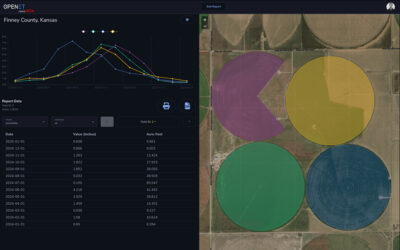The original project date was postponed due to unusually cool weather
Reno, Nev. (August 2, 2024) – In an effort to better understand urban heat islands and their impacts on our region, a group of organizations, led by the Nevada State Climate Office, is seeking volunteers to track heat on August 10 for the Reno-Sparks Heat Mapping Project. Volunteers will set out in pairs to drive or navigate a predetermined route, equipped with a GPS-equipped temperature and humidity sensor that can be affixed to a volunteer’s car.
The two previous campaign dates were postponed due to cooler weather.
“We really need a hot, clear-sky day to make the most relevant and accurate maps of our urban heat islands,” Tom Albright, interim Nevada State Climatologist and associate professor of geography at the University of Nevada, Reno, said. “We’re having one of the hottest summers on record, but ironically our first campaign date fell on the coolest day in all of July.”
Currently, volunteers are being asked to indicate their availability on August 10 and 11 of August, in case of less than ideal conditions on August 10. However, organizers have been in contact with the local National Weather Service office, and the August 10 date looks promising. Volunteers will watch a training video, fill out a knowledge check, sign a waiver, and indicate their availability for each of three shifts. Then, they will pick up their heat sensor at the Washoe County Administration Complex and drive or navigate their route. Those interested in volunteering can find more information at the project website.
The organizers are keen on ensuring that volunteers’ efforts are worthwhile by collecting data on a hotter day. After the cool weather on July 27, the first backup date of August 3 had an unsettled, cloudy and possibly stormy weather forecast.
“It’s important we get data that accurately captures the hot conditions that pose the greatest health risks,” Albright said. “These data can be used to inform policy and allocate cooling infrastructure, like trees, reflective or shade structures and cooling centers during heatwaves.”
“Moreover, the data can help add confidence in our urban models,” said John Mejia, urban climate modeler at the Desert Research Institute. “The data and model output have proven to be crucial in aiding practitioners and policy makers in developing cities to be more livable and resilient,” Mejia added.
“We plan to use this data to advocate for our most heat-vulnerable communities,” Cinthia Moore, Development Manager at Make the Road Nevada, said. “Now we will have data to back up the lived experience of many Renoites, which will allow us to push for improved policy.”
Alongside the Nevada State Climate Office at the University of Nevada, Reno, the Desert Research Institute, and Make the Road Nevada, other organizations involved are the Reno-Sparks Chapter of the Citizens’ Climate Lobby, the City of Reno, Washoe County, the Reno-Sparks Indian Colony, the Truckee Meadows Regional Planning Agency, Faith in Action, the City of Sparks, RTC-Washoe and Northern Nevada Public Health.
“This is truly a community-wide citizen science effort,” Albright said. “We’re excited to contribute important information that can advance public health and environmental justice policy.”
###
About the University of Nevada, Reno
The University of Nevada, Reno is a public research university that is committed to the promise of a future powered by knowledge. Nevada’s land-grant university founded in 1874, the University serves 21,000 students. The University is a comprehensive, doctoral university, classified as an R1 institution with very high research activity by the Carnegie Classification of Institutions of Higher Education. Additionally, it has attained the prestigious “Carnegie Engaged” classification, reflecting its student and institutional impact on civic engagement and service, fostered by extensive community and statewide collaborations. More than $800 million in advanced labs, residence halls and facilities has been invested on campus since 2009. It is home to the University of Nevada, Reno School of Medicine and Wolf Pack Athletics, maintains a statewide outreach mission and presence through programs such as the University of Nevada, Reno Extension, Nevada Bureau of Mines and Geology, Small Business Development Center, Nevada Seismological Laboratory, and is part of the Nevada System of Higher Education. Through a commitment to world-improving research, student success and outreach benefiting the communities and businesses of Nevada, the University has impact across the state and around the world. For more information, visit www.unr.edu.
About DRI
We are Nevada’s non-profit research institute, founded in 1959 to empower experts to focus on science that matters. We work with communities across the state –and the world– to address their most pressing scientific questions. We’re proud that our scientists continuously produce solutions that better human and environmental health.
Scientists at DRI are encouraged to follow their research interests across the traditional boundaries of scientific fields, collaborating across DRI and with scientists worldwide. All faculty support their own research through grants, bringing in nearly $5 to the Nevada economy for every $1 of state funds received. With more than 600 scientists, engineers, students, and staff across our Reno and Las Vegas campuses, we conducted more than $47 million in sponsored research focused on improving peoples’ lives in 2023 alone.
At DRI, science isn’t merely academic – it’s the key to future-proofing our communities and building a better world. For more information, please visit www.dri.edu.
Media Contacts:
Michelle Werdann
College of Science
University of Nevada, Reno
mwerdann@unr.edu
Elyse DeFranco, DRI
Elyse.defranco@dri.edu


